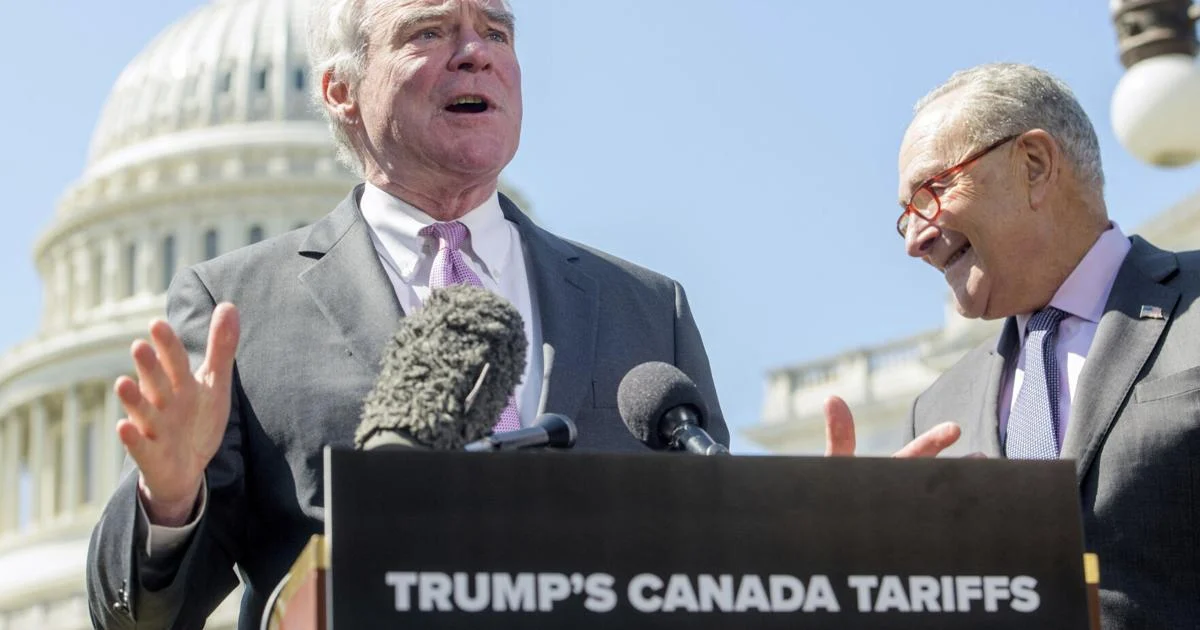
WASHINGTON — Sen. Tim Kaine, D-Va., is back again with an old tactic to challenge President Donald Trump on the president’s emergency orders to impose tariffs on companies that import foreign goods and boost fossil fuel production at the expense of clean energy industries.
Kaine planned to file a resolution Tuesday to renew his objection to tariffs that Trump has filed on products imported from Canada — including potash fertilizer critical to Virginia farmers.
He plans to file another one Thursday to challenge the president’s declaration of emergency tariffs on imports from Brazil because of its prosecution and conviction of political ally Jair Bolsonaro. Sen. Mark Warner, D-Va., is a co-sponsor of the resolution on the tariff emergency with Canada.
He’s already renewed his challenge of Trump’s declaration of a national energy emergency to fast-track fossil fuel projects.
Kaine’s question is, where’s the national emergency to justify unilateral presidential action without the consideration or consent of Congress?
In the case of Trump’s imposition of 50% tariffs on Brazilian imports, he said in an interview in his Senate office, “It’s not an emergency for the United States if Brazil prosecutes a Brazilian official who just happens to be a personal friend of Donald Trump’s.”
Kaine said the president also can’t justify the action because of a trade deficit, since the U.S. has a trade surplus with Brazil, nor does it protect a domestic industry, since the only coffee grown here are relatively small amounts in Hawaii and Puerto Rico, a U.S. territory.
With coffee prices “going up dramatically,” he said, “we’re not going to suddenly start growing more coffee in the United States.”
In a July 30 executive order titled: “Addressing threats to the United States by the government of Brazil” Trump said Brazil’s actions constitute a national emergency.
“Members of the Government of Brazil have taken actions that interfere with the economy of the United States, infringe the free expression rights of United States persons, violate human rights, and undermine the interest the United States has in protecting its citizens and companies,” Trump said.
Trump added: “Members of the Government of Brazil are also politically persecuting a former President of Brazil, which is contributing to the deliberate breakdown in the rule of law in Brazil, to politically motivated intimidation in that country, and to human rights abuses.”
Trying to force a vote
Kaine is relying on Senate rules that allow him to make a “privileged motion” to challenge presidential emergency declarations, whether for imposing tariffs, taking military actions or other unilateral executive actions without the consent of Congress. He knows they aren’t likely to pass both chambers and, if they do, the president will veto them, but they guarantee him a vote on the Senate floor.
“I’m trying to force a vote on things I think are bad,” he said.
Kaine tried the same tactic with six resolutions last spring, including one challenging Trump’s unilaterally imposed tariff on imports from Canada, another on import taxes on goods from almost all U.S. trading partners on April 2, and another to undo the energy emergency that the president declared on his first day in office.
He won in the Senate on the Canada tariffs, but the House never took up the resolution. His challenge of the global tariffs died on a tie vote that Vice President JD Vance broke. The Senate killed his challenge on the energy emergency on a party-line vote.
Senate rules give him a second bite at the apple after six months, so the three-term senator is back with a resolution co-sponsored by Sen. Martin Heinrich, D-New Mexico, to repeal the national energy emergency that Trump declared on his first day in office.
The new challenge comes with six months of evidence that Kaine said shows that Trump’s energy policy has caused home electricity prices to rise and killed jobs in clean energy projects funded under legislation signed by then-President Joe Biden.
For example, the Trump administration canceled $400 million in federal grants for clean energy projects, including $39 million for the Fairwinds Landing offshore wind logistics business in Norfolk.
“The grant had been made; the money had been spent,” he said.
The two new challenges of Trump tariff orders come on top of seven pending resolutions he already has filed — the new one on energy and six to prevent the administration from shipping undocumented immigrants to countries that are not their own. He tried a similar tactic earlier this year in response to Trump’s sudden deportation of undocumented immigrants to El Salvador.
Kaine said he also intends to file a new resolution next month to challenge Trump’s global tariffs, six months after his first bid failed. In the meantime, the U.S. Supreme Court will hear an emergency appeal of international trade and appeals court rulings that the president broke the law by unilaterally imposing tariffs under the International Economic Emergency Powers Act.
He said he expects more Republican senators to support his tariff and energy challenges than six months ago, before the policies had “a pocketbook effect.”
Now, Kaine said, Virginia farmers are paying higher prices for fertilizers and other products they need for their crops. Virginia businesses are seeing other countries retaliate against products they export, such as soybeans. And manufacturers are reluctant to invest in their operations because of the economic uncertainty he said Trump’s trade strategy has created.
“They’re saying, ‘We want to invest, but we have to know what the rules are before we invest,'” he said.
Kaine also said Trump, as a businessman, is sensitive to bad economic news, such as the softening of the labor market and the evidence of lingering inflation.
“At the end of the day, my colleagues are going to be accountable to their own voters,” he said.



